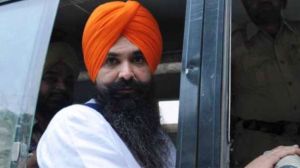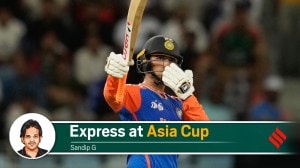ICC admits ‘minute errors’ in DRS
Debate on the UDRS got heated again during the India England Test series.
Amid a debate over the use of Decision Review System following Indian captain Mahendra Singh Dhoni questioning its accuracy,the ICC acknowledged that “minute number of errors” in DRS have been detected with the world body monitoring it closely.
Dhoni had questioned the accuracy of DRS after Rahul Dravid was controversially given out despite television replays not showing any edge off the bat during his side’s first ODI against England at Chester-le-Street yesterday.
The ICC said it has been monitoring the accuracy of ball-tracking and all decisions whether referred or not under the DRS and it has revealed “a minute number of errors in technology and that technology is not always conclusive”.
“The ICC today re-iterated that it has always,and will continue to,monitor the accuracy of ball-tracking and all decisions whether referred or not under the DRS,” the ICC said in a statement.
“Following criticism of the DRS in some areas of the media,David Richardson,ICC General Manager Cricket,re-affirmed that every decision made in Test match and ODI cricket is monitored at the ICC Headquarters in Dubai,” it said.
Richardson said that in the vast majority of cases an incorrect decision can be – and has been – rectified.
“The purpose of the DRS is to get as many decisions correct as possible. The statistics show that,with the full DRS in operation,the number of correct decisions rises to almost 98 per cent and that is what we must focus on,” Richardson said.
“Even if it is possible only to reach 98 per cent that has to be better than the average achieved without DRS of around 93 per cent,” he said.
ICC likely to debate UDRS in September meet
The ICC is likely to debate the effectiveness and accuracy of the Umpires Decision Referral with the use of existing technology during its chief executive meeting in London later this month.
Sources in the board said that although the ICC was yet release the agenda for the meeting that will take place on the sidelines of the ICC awards from September 12,there is likelihood of the UDRS issue coming up for discussion at the meeting of the CEOs.
The debate on the UDRS got heated again during the India England series and the first test between Sri Lanka and Australia in Galle.
Australia umpire Simon Taufel,the senior international ,has referred Phil Hughes’ second innings lbw dismissal in the first Test to the ICC as a serious question mark against the accuracy of Hawk-Eye,the ball tracking .
Taufel and the officiating umpires Richard Kettleborough,Aleem Dar and Tony Hill have also sent the relevant footage of incident to the ICC’s cricket operations department.
Taufel has observed the first two days of the first Test Galle in part to assess the impact of technology’s inconsistent use and accuracy,having umpired in England’s home series against India under vastly different playing and technological aids.
Taufel has said the ICC needed to see the veracity of such as Hawk-Eye,HotSpot and Virtual Eye via independent testing that sits outside the views of broadcasters and suppliers.
In the England and India series,senior batsman Rahul Dravid has now thrice suffered from debatable caught behind decisions despite them being referred to the television umpire raising questions about the accuracy of the modern technology.
The source in the PCB said that Pakistan’s stance on the use of the UDRS remained unchanged.
We still believe that it is a effective tool to reduce mistakes and errors in international matches but obviously discussions can be held on further improving the technological support for the system, the source said.
Overall if you look at the big picture the system has pretty effective especially during the World Cup and it has helped umpires, the source noted.
Asked if the chief executives meeting would debate on the of the Pakistan board to the recommendations made by the special task force on Pakistan cricket,the source said this was an issue that was taken up at the highest level by the executive board of the ICC.
Photos



- 01
- 02
- 03
- 04
- 05




























